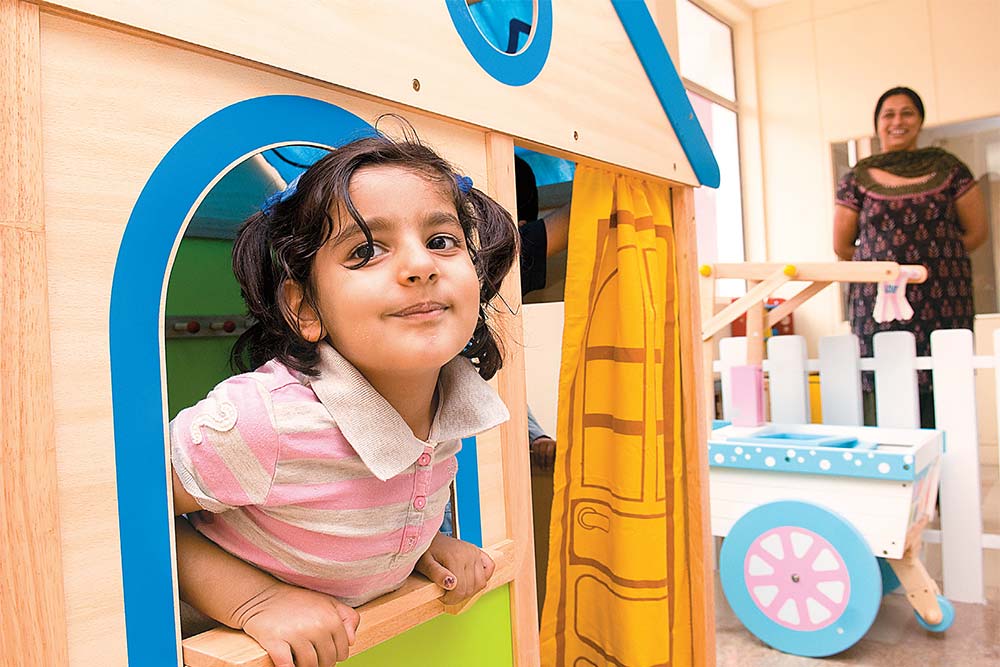Motherhood often impels women to quit corporate jobs. Getting her back to the workplace and ensuring good childcare has been a big challenge for companies. While some set up crèches in their premises, it has not really worked — providing quality childcare is not exactly the core competency of an IT or manufacturing firm. Kids, Learning and You (Klay), a chain of high-end preparatory schools and day care centres spearheaded by MphasiS founder Jerry Rao, aims to serve this need for professional and high-quality childcare.
Offered by VBHC Education Services (VES), an integrated education solutions company, Klay centres plan on being just a 10-minute drive from the mother’s office. The clientele is meant to be upper-crust corporate professionals and companies. “Klay schools are not crèches,” says Rao, chairman emeritus of VES.
“Quality education coupled with day care is a rather novel concept in India. There exists a void in this sphere.” Already several emerging players, both local and foreign, are catering to the increasing demand for pre-school and early childcare services. Among them are Esperanza, Amelio, WeCare, Bright Horizons and Knowledge Universe. Klay wants to position itself a tad different. Priya Krishnan, CEO and co-promoter of Klay, says the centres are the first in India to comply with the American standards set by the US-based National Association for the Education of Young Children (NAEYC).
Always connected
Starting off with the IT capital, the Klay schools will cover other industries soon — the first one came up in Whitefield, Bengaluru, in July 2011. After having launched three more in Bengaluru, Ahmedabad and Gurgaon this year, the plan is to add around six schools in 2012, and to scale it up to 100 schools across India, in the future. “A lot of transparency is provided to the parents,” says Krishnan.
Apart from participatory programmes, Klay schools are among the few daycares that enable parents to check on their children online. Through cameras installed in each classroom, parents can access live feeds of their toddler, with a log-in and password. Moreover, “There will be no more than 150 children per centre and the teacher-children ratio will be kept at 1:6,” says Rao. Open from 8.30 am to 7.30 pm, Klay also doubles up as a ‘homework centre’ for older children waiting for their parents after regular school. Fees range between ₹8,000 and ₹15,000 a month.
Costly care
One of the main reasons for the high fees is the real estate component. The monthly rent ranges from ₹1.5 lakh to ₹6 lakh as each centre is spread across 6,000 sq ft to 20,000 sq ft; other monthly expenses add up to around ₹4 lakh. Each Klay centre needs a capital investment of about ₹80 lakh and at least the first 10 centres are going to be internally funded.
Rao, who has no plans of taking the franchisee route, says external funding will be considered later, if necessary. “The response has been quite good. The Whitefield centre, with more than 100 children, is already making operating profits,” says Krishnan.
Parents mostly hear about it through word of mouth, but Klay’s focus is largely on employer-sponsored programmes — its marketing strategy has been to talk to companies directly. Companies ‘block seats’ for their employees and a discount in fees is arrived at depending on the number of seats blocked. Madura Coats, for instance, has blocked 20 seats at the Whitefield centre. Other clients include Infosys, HCL and HP.
While Klay is targeting institutional clients, there are other companies that are setting up exclusive onsite centres. For instance, Amelio has set one up for HCL in Chennai, and WeCare for SAP Labs in Bengaluru. Klay’s next launch is going to be an onsite centre for SAP Labs in Gurgaon.
“There are many ‘mom & pop’ kind of day care centres mushrooming all around but few vendors are building a professional chain,” says Bhuvaneshwar Naik, vice president-HR, SAP Labs. Naik says that about 120 children are looked after at Bengaluru’s onsite centre, where the company has over 4,500 employees. SAP Labs has about 600 employees in Gurgaon and Delhi and Naik expects 35-40 children to need day care services.
Indeed, the rise of the nuclear family has been an urban reality. Rao says more and more mothers wanting to head back to the corporate world is a socio-economic development with quality childcare becoming a big concern. Adds Rao, “The best part is that we did not come up with the idea. It came from the professionals who wanted something like this.”
Surely, demand for quality day-care is soaring in India, and quite a few companies are looking to tap into this potential. Though Rao may be a tad late in entering this business, his “relevant” experience should come in handy to catch up.











